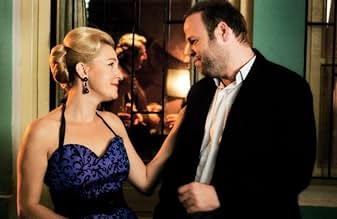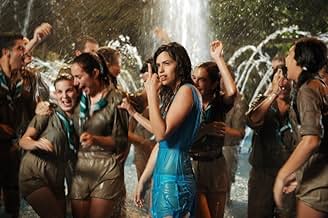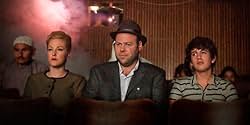Ajouter une intrigue dans votre langueDuring the summer of 1968 a teenage boy goes to work for a matchmaker who has survived the Holocaust - both their lives are forever altered.During the summer of 1968 a teenage boy goes to work for a matchmaker who has survived the Holocaust - both their lives are forever altered.During the summer of 1968 a teenage boy goes to work for a matchmaker who has survived the Holocaust - both their lives are forever altered.
- Réalisation
- Scénario
- Casting principal
- Récompenses
- 4 victoires et 7 nominations au total
Yarden Bar-Kochba
- Nili Burstein
- (as Yarden Bar Kochva)
Yael Levental
- Tikva Abadi
- (as Yael Leventhal)
Kobi Farag
- Moshe Abadi
- (as Kobi Faraj)
Eyal Shehter
- Arik Burstein (Adult)
- (as Eyal Schechter)
Ya'ackov Bodo
- Advocate Segelson
- (as Yaacov Bodo)
Ben Kippris
- Yoram
- (as Ben Kipris)
Avis à la une
After 'The Other Story', I wanted to see more of Nesher's films and found that one. Its not like the previous titles in Nesher's filmography and yet I cried so much at the ending. It really because of the charachters that nesher's having.
Sensitive, funny and smart. This movie stay with you days after watching. The directing is accurate and Adir Miller is great as the main actor (The match maker). The story really reflects the life in Israel in the late 60s' and early 70s'. The sad story of the holocaust survivors, combined with the stories of those Jews who were born in Israel, and those who immigrated from other countries rather then from Europe, or those who immigrated before WWII is shown in a very delicate way through the story of a young teenager and the matchmaker. The movie also raises some interesting moral issues and as said, It leaves you to think about it days afterwards. Great movie!!!
For once the translation of the title works better than the name of the film itself. I did not like 'Paam Haiti' - the Hebrew name of Avi Nesher's film which translates into 'Once I Was' - which says too little about the characters in the movie and the world they live in. 'The Matchmaker' while focusing only on the principal character catches the essential, as the best part in the film in my opinion is indeed the hero played by Adir Miller.
Yankele Bride is a Holocaust survivor who lives in the harbor area of the Israeli city of Haifa in 1968. This is the year after the victory of Israel in the Six Days War, maybe the best year in the history of the young country, although the clouds of the continuing conflict with the Arab countries around are often seen or heard in the headlines shouted by the boys selling newspapers (there were no TV news flashes then, at least not in Israel who was going to have its first TV station only one or two years later). However, the principal heroes of the film do not and cannot share the atmosphere of optimism around - they are Holocaust survivors who live in a country which was created to harbor them, but is unwilling or unable to cope with the horror, the pain, the shame of what they went through. The extraordinary person who is Yankele Bride tries to cure at least part of them, to find for them the peer souls, to heal by bringing love. It's an extraordinary story, which unfortunately did not result into a good film - at least in my view.
Although not as successful as Nesher's previous film 'Turn Left at the End of the World' (that one had a fantastic title!) 'The Matchmaker' enjoyed a good reception in Israel. I confess I did not like it. I simply cannot cope with Nesher's style which mixes moving stories with the traditional (and outdated IMO) style of film-making that was popular in the 70s and 80s in Israel. His usage of popular actors is a waste, and having the extraordinary Miller and the tragic act of Maya Dagan coexist with the unnecessary make-up applied to Dov Navon and the clowny act of Eli Yatzpan is a combination that simply does not work. The coming to age story while acted quite well by the younger actors was unclear and brought back forcefully memories of an older film of Nesher (Ha Lahaka - The Band) from the beginning of the 80. Nesher has problems in telling the story even with the help of off-screen comments. Emphasize was put on building the atmosphere of Haifa in the 60s and this succeeds pretty well, but other details are carelessly treated - the characters are supposed to speak Hebrew with a Romanian accent, but this not how Romanian accent sounds in Hebrew, and worst of all - a Jew from Iasi (Yassi) in Romania would have had close to zero chances to get into Auschwitz during the second world war where numbers where tattooed on the arms of the prisoners. Overall this film deals with an important theme and brings to screen interesting characters, but the realization is disappointing, and even Adir Miller's impressing performance cannot save it from failure.
Yankele Bride is a Holocaust survivor who lives in the harbor area of the Israeli city of Haifa in 1968. This is the year after the victory of Israel in the Six Days War, maybe the best year in the history of the young country, although the clouds of the continuing conflict with the Arab countries around are often seen or heard in the headlines shouted by the boys selling newspapers (there were no TV news flashes then, at least not in Israel who was going to have its first TV station only one or two years later). However, the principal heroes of the film do not and cannot share the atmosphere of optimism around - they are Holocaust survivors who live in a country which was created to harbor them, but is unwilling or unable to cope with the horror, the pain, the shame of what they went through. The extraordinary person who is Yankele Bride tries to cure at least part of them, to find for them the peer souls, to heal by bringing love. It's an extraordinary story, which unfortunately did not result into a good film - at least in my view.
Although not as successful as Nesher's previous film 'Turn Left at the End of the World' (that one had a fantastic title!) 'The Matchmaker' enjoyed a good reception in Israel. I confess I did not like it. I simply cannot cope with Nesher's style which mixes moving stories with the traditional (and outdated IMO) style of film-making that was popular in the 70s and 80s in Israel. His usage of popular actors is a waste, and having the extraordinary Miller and the tragic act of Maya Dagan coexist with the unnecessary make-up applied to Dov Navon and the clowny act of Eli Yatzpan is a combination that simply does not work. The coming to age story while acted quite well by the younger actors was unclear and brought back forcefully memories of an older film of Nesher (Ha Lahaka - The Band) from the beginning of the 80. Nesher has problems in telling the story even with the help of off-screen comments. Emphasize was put on building the atmosphere of Haifa in the 60s and this succeeds pretty well, but other details are carelessly treated - the characters are supposed to speak Hebrew with a Romanian accent, but this not how Romanian accent sounds in Hebrew, and worst of all - a Jew from Iasi (Yassi) in Romania would have had close to zero chances to get into Auschwitz during the second world war where numbers where tattooed on the arms of the prisoners. Overall this film deals with an important theme and brings to screen interesting characters, but the realization is disappointing, and even Adir Miller's impressing performance cannot save it from failure.
The Israeli movie Once I Was (Pa'am Hayiti) was shown in the US with the title The Matchmaker (2010). It was written and directed by Avi Nesher. The film was very popular in Israel, where it won four Israeli Academy Awards. The other reviewers of this film are either Israelis or are familiar with Israeli culture, so they can do a better job than I can discussing the reality of the movie. For example, it is set in the seaport of Haifa in 1968, and there are questions about the authenticity of the sets and the accents. I will leave these topics to the experts.
I'm reviewing the film more on its plot and acting. The plot is fascinating. A Holocaust survivor, Yankele Bride (Adir Miller) is a smuggler and petty criminal. That's his profession, but his hobby is matchmaking. His job is to find mates for people who, for whatever reason, are considered undesirable.
The saddest of these people is a young woman, Sylvia, who is very beautiful but has achondroplasia. (The role is played by the extraordinary actress Bat-El Papura.) Sylva wants to be married, but no person of normal height will consider her as a spouse. Even the hapless character called Meir the Librarian turns away from Sylvia when he meets her. Yankele does his best for her, but he never succeeds.
The most obvious theme of the movie is a coming-of-age story of Arik Burstein (Tuval Shafir), whose father is also a Holocaust survivor. Arik starts work as Yankele's "spy," the person who checks out the matchmaker's clients to make sure that they are who and what they say they are. (There's another theme about a visiting American cousin, who is a liberated young woman, but that subplot never goes anywhere.)
The key theme, as I saw it, is that Holocaust survivors were welcomed to Israel, but they weren't admired or honored. As Arik's father says, "people always want to know what we had to do in order to survive." The clash of cultures--eastern European survivors who were seen as victims vs. Israelis who had fought for independence--is in the background of the entire movie. (Sometimes this clash is overt, sometimes it's subtle, but it's always there.)
Of course, Arik is impressed by the brash, streetwise Yankele, as opposed to his own quiet, respectable father. We are supposed to be impressed by Yankele too, because his criminal activities are treated as amusing foibles. I don't think that smuggling goods into Israel was an appropriate way to thank the country that took you in, but he is definitely a likable character in the movie. Each viewer will have to decide about Yankele for herself or himself.
I liked this film well enough to suggest that it's worth seeing if it comes along. I'm not sure it's a movie I would seek out for viewing. We saw The Matchmaker at the excellent Rochester Jewish Film Festival, screened at the wonderful Dryden Theatre at George Eastman House. It will work equally well on a small screen.
I'm reviewing the film more on its plot and acting. The plot is fascinating. A Holocaust survivor, Yankele Bride (Adir Miller) is a smuggler and petty criminal. That's his profession, but his hobby is matchmaking. His job is to find mates for people who, for whatever reason, are considered undesirable.
The saddest of these people is a young woman, Sylvia, who is very beautiful but has achondroplasia. (The role is played by the extraordinary actress Bat-El Papura.) Sylva wants to be married, but no person of normal height will consider her as a spouse. Even the hapless character called Meir the Librarian turns away from Sylvia when he meets her. Yankele does his best for her, but he never succeeds.
The most obvious theme of the movie is a coming-of-age story of Arik Burstein (Tuval Shafir), whose father is also a Holocaust survivor. Arik starts work as Yankele's "spy," the person who checks out the matchmaker's clients to make sure that they are who and what they say they are. (There's another theme about a visiting American cousin, who is a liberated young woman, but that subplot never goes anywhere.)
The key theme, as I saw it, is that Holocaust survivors were welcomed to Israel, but they weren't admired or honored. As Arik's father says, "people always want to know what we had to do in order to survive." The clash of cultures--eastern European survivors who were seen as victims vs. Israelis who had fought for independence--is in the background of the entire movie. (Sometimes this clash is overt, sometimes it's subtle, but it's always there.)
Of course, Arik is impressed by the brash, streetwise Yankele, as opposed to his own quiet, respectable father. We are supposed to be impressed by Yankele too, because his criminal activities are treated as amusing foibles. I don't think that smuggling goods into Israel was an appropriate way to thank the country that took you in, but he is definitely a likable character in the movie. Each viewer will have to decide about Yankele for herself or himself.
I liked this film well enough to suggest that it's worth seeing if it comes along. I'm not sure it's a movie I would seek out for viewing. We saw The Matchmaker at the excellent Rochester Jewish Film Festival, screened at the wonderful Dryden Theatre at George Eastman House. It will work equally well on a small screen.
10zaaq
1. Not the greatest actors and accents but it boasts carefully written dialogue, captivating characters, and an aesthetically pleasing 70's summer vibe of the region.
2. This movie packs dating angst and teenage nostalgia (for today's boomers), which isn't difficult to relate - mandela effect, anyone? ;P
3. The plot has a nice pace (no stalling/filler imo) and there are moral lessons all along the way. Some lines even came back to me just now; so I decided to recommend it.
Please let me know if you liked me review, it helps :) Thanks
2. This movie packs dating angst and teenage nostalgia (for today's boomers), which isn't difficult to relate - mandela effect, anyone? ;P
3. The plot has a nice pace (no stalling/filler imo) and there are moral lessons all along the way. Some lines even came back to me just now; so I decided to recommend it.
Please let me know if you liked me review, it helps :) Thanks
Le saviez-vous
- AnecdotesAuthors mentioned by Meir and Arik in the library include Dashiell Hammett, Ernest Hemingway, Shmuel Yosef Agnon (1888 -1970; Nobel Prize laureate writer and a major figure of modern Hebrew writing) and Yehiel Dinur (1909 - 2001; also spelled Dinoor or De-Nur; also known by his pen name Ka-Tsetnik, a Jewish writer and Holocaust survivor).
- GaffesArik has a promotional picture of John Wayne from the film, "The Cowboys:", on his wall. This film was not released until i972, 4 years after this film's setting.
- Crédits fousComposer Philippe Sarde wishes to dedicate his score in memory of his grandmother Marie.
- ConnexionsReferences Le Kid (1921)
- Bandes originalesBalkan Folk Songs
Accordion by Anatolie Gieko
Violin by Pavel Levine
Meilleurs choix
Connectez-vous pour évaluer et suivre la liste de favoris afin de recevoir des recommandations personnalisées
Détails
Box-office
- Budget
- 2 150 000 $US (estimé)
- Montant brut mondial
- 2 920 $US
- Durée1 heure 52 minutes
- Couleur
- Mixage
Contribuer à cette page
Suggérer une modification ou ajouter du contenu manquant
































